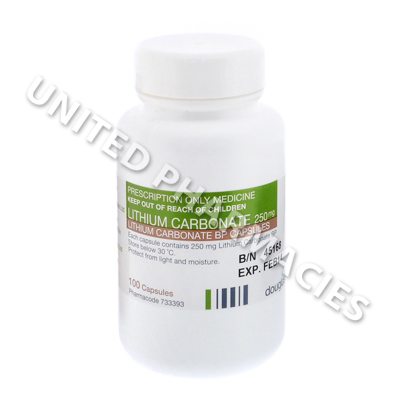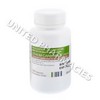Customers also like
Licab (Lithium Carbonate) - 300mg (10 Tablets)
from only £2.13
Lithicarb (Lithium Carbonate) - 250mg (500 Tablets)
from only £70.01
Lithicarb (Lithium Carbonate) - 400mg (100 Tablets)
from only £20.49
Lithosun (Lithium Carbonate) - 300mg (10 Tablets)
from only £2.64
Quetapel (Quetiapine Fumarate) - 25mg (90 Tablets)
from only £9.87
Description
| Main Use | Active Ingredient | Marketed Name |
| Bipolar disorder | Lithium Carbonate | Lithium Carbonate |
Uses
Lithium Carbonate (Lithium Carbonate) is a type of inorganic compound that has been widely used for bipolar disorder, as it can function as a mood stabiliser and help to reduce mania in patients affected by this condition. It is thought to work by affecting sodium transport in the muscles and nerves and by preventing the action of PKC (protein kinace C) in the patient's brain.
As sodium is believed to be involved in mania, this may help to correct the chemical imbalance that causes mania, aggression, hostile behaviour, elation, hyperactivity and other symptoms of bipolar disorder. Other conditions for which patients have used this medicine include major depression, cluster headaches, arthritis, schizophrenia, alcoholism and other conditions which have not been listed here.
Dosage and Administration
Lithium Carbonate (Lithium Carbonate) capsules contain 250mg of the active ingredient. Swallow the capsule whole alongside a glass of water. Patients may be given special dietary instructions during treatment, such as consuming food with a normal sodium content. If the amount of sodium you consume is changed, this may affect the levels of lithium in your blood. Your doctor will need to carefully determine the correct dosage, as excess amounts of lithium could lead to serious side effects. Adults are sometimes told to take the medicine 3 to 4 times per day, however, it is essential to adhere to all dosage instructions provided by your doctor.
Side effects
Patients taking Lithium Carbonate (Lithium Carbonate) may notice side effects, and a list of some possible reactions is given here:
- Shaky hands
- Poor appetite
- Increased salivation
- Taste sensation changes
- Sensitivity to the cold
You must ensure that your doctor is kept informed of all side effects that occur. Infrequent but serious side effects are possible in patients taking this drug. Seek medical attention straight away if you notice excessive urination, extreme thirst, a ringing noise in the ears, pain in the fingers or toes, visual changes or any other severe reactions which have not been listed here.
Precautions
Care should be taken to ensure that dehydration does not occur. Your doctor will tell you the correct amount of liquids to drink, in order to avoid this.
Blood tests will be needed to check your lithium levels.
Seek immediate emergency medical attention if you suffer an allergic reaction. Symptoms to watch for, which may be indicative of a reaction, include skin rashes, hives, swelling of the face or limbs, trouble breathing, and trouble swallowing.
Always use Lithium Carbonate (Lithium Carbonate) as you have been prescribed by your doctor. Never self-medicate or change your dosage without first consulting your doctor. The correct dosage can vary depending on your health, medical history, and the severity of the condition being treated.
This medication may not be safe for all patients. Before you begin using it always disclose the following to your doctor:
- If you are pregnant or breastfeeding.
- If you suffer from any allergies.
- If you suffer from any other health conditions or illnesses.
- If you are using any other medicine (including all non-prescription).
- If you are using any supplements, vitamins, or herbal products of any kind.



-Tab-300mg-UK-1s.jpg)
-Tab-250mg-UK-1s.jpg)
-Tab-400mg-UK-1s.jpg)
-Tab-300mg-UK-1s.jpg)
-Tab-25mg-UK-1s.jpg)



